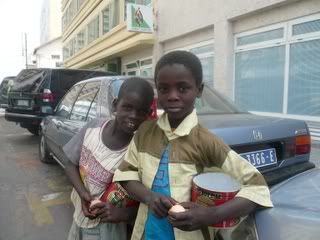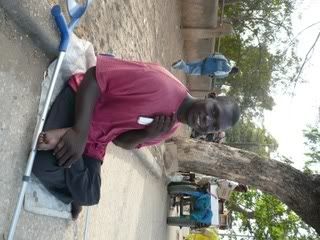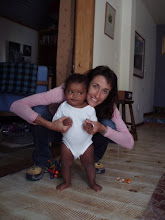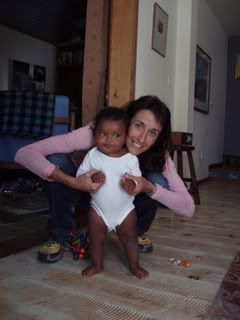
The thing is, Senegal is more or less a prosperous place, as Africa goes, and this begging is not entirely necessary. It is child slavery, and these boys are rounded up and used by regional Islamic leaders (called marabouts) to collect money for their own personal uses. I hesitate to write about this, because I don't want to contribute to religious prejudice or feed any idea that Islam is a bad religion. However, in this instance, with these leaders and these children and this government, it is not working out so well.
Most Senegalese are Muslim, but they don't tend to be too strict about it. Most do not pray five times a day, and women's heads are uncovered. But still, on Fridays the men dress up and fill the labryntine streets, facing east, moving across prayer mats as they bow, kneel, stand, bow. There is faith and duty and pilgrimage. And, especially in the countryside, men have multiple wives and even larger multiples of children, not all of whom can be cared for. And so some boys are sold or offered to these Islamic boarding schools in cities so far away that they sometimes never see their families again. As consolation, their illiterate parents are told that the boys will go to school and also learn to recite the Koran. That they will have a safe place to sleep and good food and be taken care of. And so, 6, 7, 10 years old, the boys go. They do study the Koran, but only to memorize it rote. They sleep in mosquito- and fly-infested bunks and are fed next to nothing, and during the days, every day, they are sent to beg. To teach humility.
Mondays through Fridays, 500 cfa ($1.25). Saturdays, 250 cfa. Sundays, 200 cfa. Minimums based on how many people are expected to be walking around on each given day. Minimums that, if not met, bring beatings and bed without dinner. My Senegalese friend says that to give the boys money or to give them food (which they would sell to get money), is to perpetuate the problem. Which I can see is true. But there is also the immediacy of their hunger, of their beatings and of the questionable relevance of whatever precedents I may or may not be setting. But still, I see her point. And the truth is, there are a TON of other people to give money to. My leper men on the corner, the one-armed woman with her nursing baby, sitting outside the market; the convoy of women in wheelchairs who swarm as I leave the plaza each day; Mohammed with polio, who is 24 and has not walked since he was 8, who sits cross-legged and Buddha-smiling all day long, and who, wen you give him a dollar, seizes your hand and says "I shall not forget this kindness." They all need something from me, and they don't have this uncomfortable Islamic thing on them. (Although, I have to say, the wheelchair women really look rather well fed. Rather fat, actually.) Below is a photo of Mohammed. He is a prince. (More on his story on another day.)

Which leaves me ... where? For the first week, I gave some coins. The second week, once I figured the whole story out, I cleverly avoided eye contact. Then a few times I tried touching the boys instead, putting my hand on their backs or squeezing a shoulder. To at least acknowledge them and show them that I couldn't give them anything but that it was nothing personal. (I am embarrassed to write this, by the way. So lame and thoughtless and dumb.) The boys, wisely, would just wiggle and shrink away, only interested in filling their quotas and also having no idea what to think of the weird, stingy white woman. Lately I have taken to breaking an orange or a boiled egg in half and giving it to them that way, stripped of all resale value, with a command to "Eat it now," right there in front of me. This actually works pretty well, although my purse sort of has that sulphurous smell to it now.
And there is an NGO, thank God. A Senegalese- and foreign-funded NGO that provides a day house for the boys to clean up and play football and to understand that there are adults who care about them and that they have rights. That they are valued. If the boy gives the go-ahead, the group will petition the marabout (headmaster) and sometimes he will release the boy from his "studies" into the care of the NGO, where he could be reunited with his family or his distant family or sometimes, occasionally, accepted into another home as a foster child. I should say here that almost all Senegalese I've talked to seem to think this whole racket is terrible; they feel caught in the same ways that I feel caught about what to do or how to help. The government won't get involved because, even though child slavery is illegal in Senegal, this is considered a religious issue.
The NGOs website is empiremosaiquedumonde.org. It is in French (welcome to my world), but you can translate it easily by going to http://babelfish.altavista.com/ and then plugging in the website name and clicking "translate web page." I have been accepted to volunteer there when I return to Senegal in May. It would be difficult, with the baby and with the orphanage work that I really do want to continue. But anything else I do, including the eggs or the oranges or even the coins, just feels too much like turning away from them.





2 comments:
Thank you for this post. I enjoy your blog and am learning so much...important information.
Wow. You are such a great writer doing great things, and articulating such difficult issues so well. Thanks!
Post a Comment